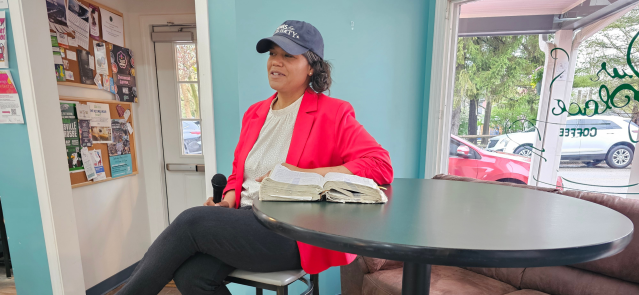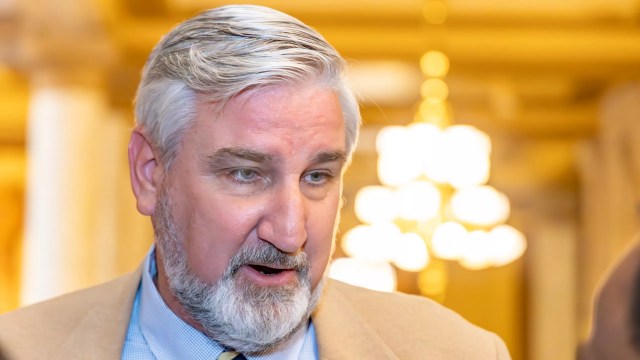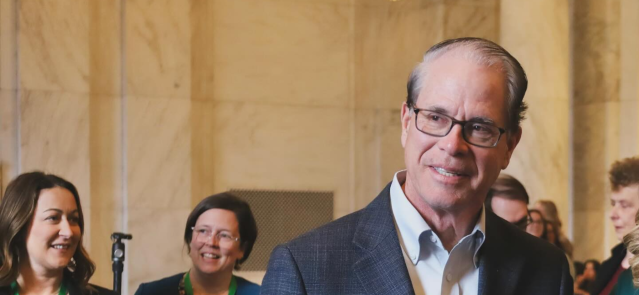Stay ahead of the curve as a political insider with deep policy analysis, daily briefings and policy-shaping tools.
Request a Demo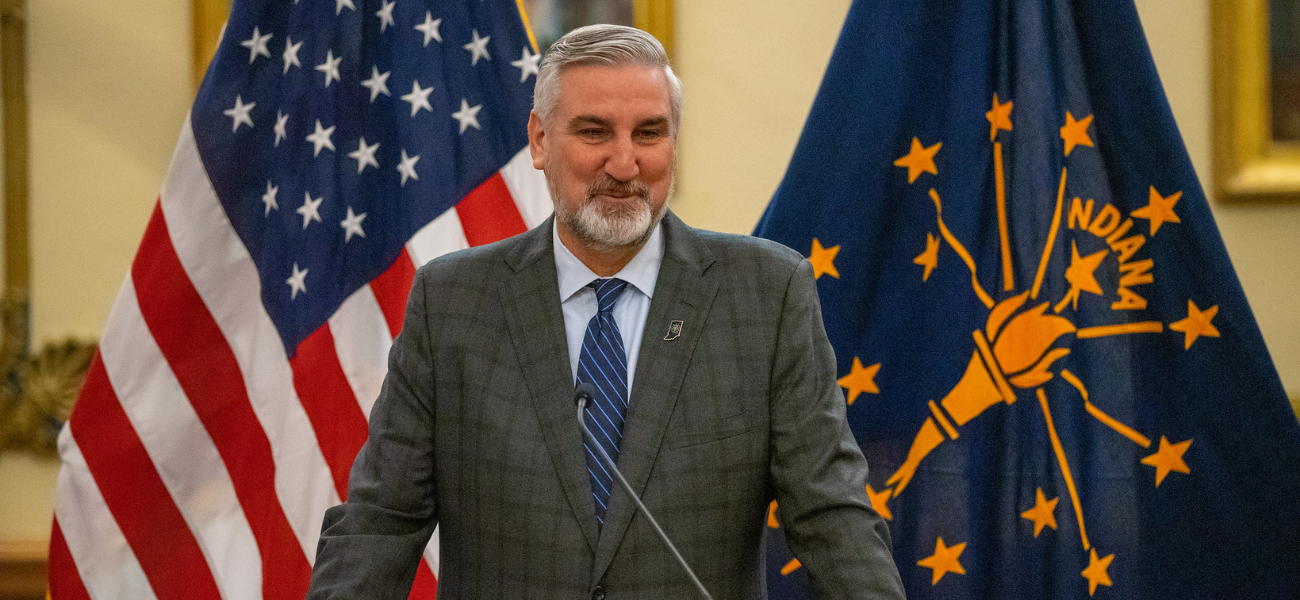
Gov. Eric Holcomb speaks on his appointment of Judge Dana Kenworthy to the Indiana Court of Appeals. (Credit: Gov. Eric Holcomb's office)
Update, April 20, 2023: House Republicans released their budget plan on Feb. 17. Read about that proposal here. Senate Republicans released their proposed budget plan on April 13. Read about that proposal here.
The Gist
Gov. Eric Holcomb released his 2023 legislative agenda Wednesday, which included his plans for how to spend taxpayer money in the state’s two-year budget. He’s allocated approximately $5.5 billion additional dollars over the biennium, for a total price tag of roughly $43 billion.
Here’s what some of that extra money will go toward and how it will impact Hoosiers.
Free textbooks
Holcomb wants to prohibit K-12 textbook and curricular material fees for Indiana families, allocating $160 million each year to help backfill that cost to schools. Indiana is currently one of only seven states that allow such fees.
More public health funding
His agenda also includes $347 million over the next two years toward public health, a portion of what the Governor's Public Health Commission had requested to rightsize Indiana’s low public health funding. The majority of that money will go directly to local health departments which will have to opt-in in order to receive the state funds.
Before the pandemic, Indiana only spent $55 per capita on public funding, compared to the U.S. average of $91, according to a report from the commission.
"We're going to have to do something different if we want a different outcome," Holcomb said, referring to Indiana's poor ranking on various health metrics.
Why should Hoosiers care? Local health departments do everything from food inspections to septic system reviews to disease and trauma prevention, but the extent of services varies by department, leading to unequal health care access across the state. Right now some counties, for example, provide tobacco cessation programs, HIV testing, or wellness checks for children, while others do not.
Free books for young children
Holcomb’s agenda includes $4.1 million to implement the Dolly Parton Imagination Library statewide, which provides children from birth to 5 years old with one book per month.
That doesn’t mean every child will get a book in Indiana; it just means that if local entities come up with half of the money to implement the program, the state will throw in its share of money in order to provide books for every young child in that community.
More education funding
Hoosiers, especially teachers, could see the benefits of more education funding at all levels, from pre-K to higher education.
At the K-12 level, Holcomb wants to increase funding by 6% in fiscal year 2024 and an additional 2% in fiscal year 2025, in hopes that teacher salaries continue to increase. The goal is to increase the average teacher salary to $60,000 per year, up from the current average of $56,600.
Holcomb's administration also wants to make it easier for Hoosiers to obtain a college diploma. For example, his agenda includes the development of a pilot program providing additional aid for those recieving unemployment insurance who want to complete their diploma.
More pre-K and child care options
More Hoosier families could qualify for free pre-K education if Holcomb’s budget plan passes as is.
The governor wants to expand the income eligibility for those who qualify for state-funded pre-K to 138% of the federal poverty limit, instead of the current 127%, using a combination of federal and state funds. That should mean about 5,000 more lower-income families will be eligible for pre-K each year.
His administration also wants to expand child care options in general across the state, by dedicating $25 million worth of federal funds toward a grant program incentivizing employers to provide on-site child care.
More trail money
If you’ve noticed more trail construction in your communities in recent years, it’s likely some of that money came from the state. Holcomb wants to continue encouraging more trail growth in Indiana, requesting $50 million for the trail grant program.
What else is in Holcomb’s plan
Holcomb’s plan also includes $500 million worth of economic development grants, $184 million additional for higher education, $160 million worth of pay increases in order to attract and retain state employees and $36 million to increase state law enforcement pay. The latter would raise the starting pay for state police from $53,690 to $70,000.
He also hopes to up access to mental health treatments, improving the 988 mental health hotline and connected services.
What’s next
Holcomb’s plan is by no means a done deal. House and Senate Republicans will both release their own versions of the budget over the course of the legislative session, which starts Monday. And while Holcomb is a Republican, his priorities likely won’t all line up with what the two chambers want.
Both chambers have to approve the same version of the budget by April 29, when lawmakers sine die.
Holcomb is optimistic about his chances.
"This is not my first rodeo," he said after unveiling his agenda. "Our agency heads have been working hard on all of these items. We think that [our requests are] not just legitimate, we think that they're needed, which helps us not be cocky about it, but confident that we can be persuasive."
Contact Kaitlin Lange on Twitter @kaitlin_lange or email her at [email protected].
Twitter @STATEAFFAIRSGA
Facebook @STATEAFFAIRSUS
LinkedIn @STATEAFFAIRS
Header image: Gov. Eric Holcomb speaks on his appointment of Judge Dana Kenworthy to the Indiana Court of Appeals on Dec. 21, 2022. (Credit: Gov. Eric Holcomb's office)
Read this story for free.
Create AccountRead this story for free
By submitting your information, you agree to the Terms of Service and acknowledge our Privacy Policy.
Who is Jamie Reitenour? Indianapolis mom mobilized volunteers to make governor’s ballot
EDITOR’S NOTE: This is one in a series of profiles of the candidates running for Indiana governor.
ZIONSVILLE, Ind. — It wasn’t the largest campaign event the 2024 election cycle is likely to see.
About 15 people, some of them children, gathered on a rainy April night at Our Place Coffee, nestled just feet from the watchful eye of Zionsville’s Abraham Lincoln mural. But Republican gubernatorial candidate Jamie Reitenour, an Indianapolis mom with no previous political experience, spoke with every single one of them.
It was one part coffee-and-issues politicking and one part informal Bible study, complete with scripture quiz questions for the kids in attendance.
Reitenour, well-worn Bible in hand, shared her oft-repeated story of being called by God to run for governor about six years ago — a destiny confirmed by friends and strangers alike along the way, she said. This charge, she told the group, would allow her to rise above traditional campaign currency, such as fundraising dollars and polling numbers.
Suzanne and Shon Hough sponsored the event after meeting Reitenour at their shared church, Horizon Christian Fellowship in Lawrence.
“As soon as we met her, we knew this is someone to support,” Suzanne Hough said. “We knew she wasn’t a politician. She was called. She has a love and compassion for people.”
That is how Reitenour has made it this far — how she gathered the 4,500 state-mandated signatures to qualify for the May 7 primary ballot, how she’s made it onto a stage filled with more experienced and wealthier opponents. For more than a year, she’s hosted several small events per week throughout the state, traveling some 35,000 miles, by her count.
The dozen or so latte-sipping supporters had a part to play, the candidate said.
“Go to your contact lists and tell them about our Facebook,” Reitenour said. “We could reach 144 people today if we all did that.”
The call
Reitenour’s purpose changed in 2017 while walking through downtown Indianapolis with her husband, Nathan.
“I just heard a whisper: You’re going to be the governor of Indiana,” Reitenour told State Affairs.
The couple wandered over to the governor’s mansion.
“We looked at it and thought, ‘That does not look like our family,’” she recalled. “So I just put the calling on the shelf.”
Indiana requires gubernatorial candidates to have lived in the state for at least five years. She had only just moved from Michigan.
Reitenour believed the country was in a good spot under then-President Donald Trump. Why would she need to run?
“I just thought about it,” Reitenour said. “Why would the Lord call an ordinary person to something like that when the nation was doing so well? But the reality of scripture is that you see these times where people are called, and you can see the reasons for the calling around them.”
Her regular Bible contemplation soon took her to the Book of Nehemiah, who was a governor. Another sign, she said.
The state’s response to the COVID-19 pandemic set off alarm bells for Reitenour, who considered steps like mask requirements an affront to personal liberty. She brings up the subject often, and it made it into her coffeehouse remarks.
“How am I in a conservative state, but I don’t feel free?” she told the crowd.
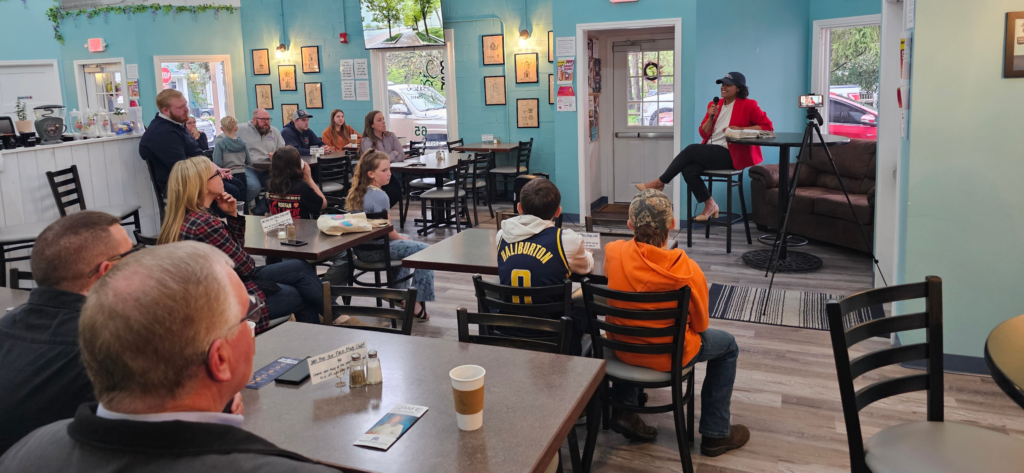
After COVID-19 and the election of President Joe Biden, Reitenour began to think more seriously about running for governor.
Her mission was affirmed first by a close friend, whom Reitenour said received a similar calling from God to help her candidacy, and then by strangers, whom she said confirmed her destiny during separate chance meetings at a Panera Bread location.
She began to meet with church groups and advocacy organizations that align with her views, including Moms for Liberty and Indiana Right to Life. Despite being referred to as an activist on the campaign trail, Reitenour said she is not part of any activism group.
Getting on the ballot
This network of like-minded supporters would soon serve as the volunteer arm of Reitenour’s campaign.
Indiana requires candidates for governor to collect at least 4,500 signatures from voters, including at least 500 from each of the state’s nine congressional districts. It’s a tall order even for seasoned politicians, who often hire specialized operatives for the task.
“The mystery of how we did that will also be the mystery of how we win,” Reitenour said.
She focused on growing supporters and gathering signatures at each small event she hosted, then mobilizing those attendees to gather still more for her.
“I had a formula in my heart for this that the Lord gave me at 4 a.m. one morning,” she said.
The campaign
Reitenour made the ballot, but she is the least-known candidate in a field that includes Sen. Mike Braun, Lt. Gov. Suzanne Crouch, former state Attorney General Curtis Hill, former state Secretary of Commerce Brad Chambers and Eric Doden, a Fort Wayne businessman and previous president of the Indiana Economic Development Corp.
She has no previous political experience. She is a stay-at-home mom who also homeschools her five children and volunteers through ministry. Her previous work experience includes compliance management at a mortgage company, secretarial work and even a stint as an assistant coach in women’s field hockey.
Reitenour was selected in the governor’s race by just 2% of respondents in a recent State Affairs/Howey Politics Indiana poll, tying her with Hill for last place behind front-runner Braun (44%). She has consistently polled in the low single digits.
While other gubernatorial candidates can draw from years of campaign fundraising experience or millions in personal finances, Reitenour had raised just a little more than $54,000 as of March 31.
She has thus found herself paddling in a proverbial ocean of campaign spending.
The four top-polling candidates — Braun, Chambers, Doden and Crouch — have spent a combined $20 million.
After participating in the first gubernatorial debate on March 11, Reitenour did not qualify for a March 27 debate hosted by WISH-TV due to her fundraising numbers, as the television station required candidates to have raised $300,000 by December.
She was also excluded from a March 26 Fox59/CBS4 debate for not reaching a 5% polling threshold. She will be included in the final April 23 debate, hosted by the Indiana Debate Commission.
Reitenour has campaigned using a constantly shuffling group of volunteers. She has only one full-time employee: campaign assistant Casey Pierce, who met Reitenour through his mother’s church.
“It just felt like the right thing to do,” Pierce said of joining the campaign. He has never worked in politics before.
Pierce called his initial meeting with Reitenour “a Holy Spirit encounter.”
Reitenour’s platform
Reitenour described education as the state’s “greatest vulnerability,” and thus her primary platform.
“The next generation is not being educated well, and this has been a long time coming,” Reitenour said.
She has received guidance from the Hamilton County chapter of Moms for Liberty, which made national headlines in 2023 after using a quote attributed to Adolf Hitler in its first newsletter. The nonprofit, which pushes against socially minded education reforms like critical race theory, subsequently apologized.
Reitenour likewise opposes ideas like social-emotional learning in classrooms. Her plan also proposes removing technology from grades K-5, calling for private businesses to sponsor classrooms and requiring all students to pursue an apprenticeship before high school graduation.
She also favors an audit of the Indiana Economic Development Corp., tax cuts, a focus on investing in small towns and generally “pointing Indiana in the direction of family.”
The future
At her coffee shop appearance, Reitenour shied away from admitting her long odds in the race.
“The political system is meant to squeeze people out, but I am working against it,” she said.
She pledged to continue organizing no matter the primary election results.

About Reitenour
- Age: 44
- Hometown: Indianapolis
- Education: Psychology degree from Missouri State University
- Family: Married to Nathan Reitenour, with five children, ages 13, 11, 10, 9 and 4
- Job: Stay-at-home mom, homeschool teacher
- Work history: Former compliance manager at Windsor Capital Mortgage, former athletic director at Calvary Christian School (at Calvary Chapel Vista church in California)
Read these related stories
- Eric Doden is running from behind but hopes his ‘bold vision’ will propel him forward
- Suzanne Crouch positions herself as a ‘different’ candidate for the voiceless
Contact Rory Appleton on X at @roryehappleton or email him at [email protected].
And subscribe to State Affairs so you do not miss an update.
Facebook @stateaffairsin
Instagram @stateaffairsin
LinkedIn @stateaffairs
Child care: Where Republican candidates for governor stand
Six candidates are seeking the Republican nomination for Indiana governor in the May 7 primary. State Affairs is providing looks at their stances on several issues. Jennifer McCormick is unopposed for the Democratic nomination.
Indiana’s high cost of child care ranks as a primary concern for many of the state’s families.
According to Child Care Aware of America, a nonprofit organization that studies child care costs, Indiana ranks as the eighth most expensive state for infant and toddler care. The cost for caring for a baby averages 14.5% of a family’s median income, while toddler care is 12.9%.
Only 5% of Indiana families can afford infant care, the Economic Policy Institute found.
State Affairs asked each of the six Republicans vying for Indiana governor — U.S. Sen. Mike Braun, former state Secretary of Commerce Brad Chambers, Lt. Gov. Suzanne Crouch, Fort Wayne businessman Eric Doden, former state Attorney General Curtis Hill and Indianapolis mother Jamie Reitenour — how they would lower Indiana families’ child care costs if elected.
Here are their responses.

Mike Braun
“The high cost of child care burdens Hoosier families and businesses, who are trying to recruit and retain the best workers. As governor, I am open to and will work on solutions that will reduce the cost of child care, which is a win for our economy and families.”

Brad Chambers
“As governor, I’ll explore strategic expansions of all-day pre-K for 3- and 4-year-olds, including potentially increasing the income eligibility level for state-funded pre-K programs. I’ll create a state-level child care tax credit that requires recipients to work to be eligible to receive it.”
Chambers said he would also explore incentives for employer-sponsored child care.

Suzanne Crouch
“First, I would lead the effort to eliminate the state’s individual income tax, which will mean more money in families’ pockets and help reduce the financial strain of child care expenses … As governor, I would propose that the General Assembly put a priority on early childhood education throughout Indiana.”
Crouch would also support the expansion of at-home and religious-based child care, she said, noting Indiana has “some of the highest relative child care costs in the country.”

Eric Doden
“I’ve offered a bold plan to expand pre-K access to every community in the state. By partnering with communities, nonprofits and education partners, we will begin addressing this important need. … We need a state with thriving communities and access to opportunity. Cost of child care concerns are downstream of family formation rates, good-paying jobs, home ownership and a host of other economic and community issues.”

Curtis Hill
“The government is not responsible for providing child care for private sector employees. Its responsibility is to dismantle the licensing and regulatory burden that prohibits new child care providers from entering the market. If we want to lower the cost of child care, we must cut the government regulations forcing child care facilities to either close or raise prices to meet unnecessary government requirements.”

Jamie Reitenour
“We cannot bear down on taxpayers for everything. We just cannot do it. But we can talk to the private sector and reason together. Can we have in-house day cares at offices? Yes. Can we have employers operate growth centers for employees’ kids? Yes. Taxpayers are not the answer; the private sector is. With competition for qualified workers, larger businesses already employ creative benefits, including child care assistance, to attract talent.”
Read these related stories:
Contact Rory Appleton on X at @roryehappleton or email him at [email protected].
And subscribe to State Affairs so you do not miss an update.
Facebook @stateaffairsin
Poll finds Holcomb popular among Republicans even as potential successors keep distance
Indiana Gov. Eric Holcomb remains popular among Republicans, according to a State Affairs/Howey Politics Indiana poll, even as the GOP candidates to take his place have kept their political distance from him. The polling results released Thursday show Holcomb with an overall positive job-approval rating of 69% among self-identified Republicans and Republican-leaning independents. The results …
‘It’s sort of a blowout’: Braun holds commanding lead in ‘State Affairs/Howey Politics Indiana’ poll
U.S. Sen. Mike Braun holds a commanding lead in a new State Affairs/Howey Politics Indiana poll of likely Hoosier Republican voters in the May 7 gubernatorial primary. Asked who they would vote for if the primary were held today, 44% of respondents picked Braun. Lt. Gov. Suzanne Crouch trailed with 10% of the vote, and …

